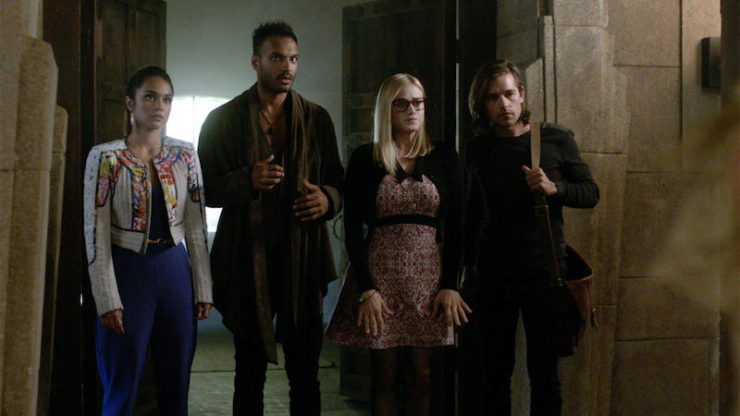What if the start of a show’s second season … was really the end of the show’s first season? “Hotel Spa Potions” has a really specific feeling that I can only describe as “seems like it should be the third-to-last episode of a season, where everyone stocks up on what they need for eventual battle.” A moderate number of intriguing things happen, but mostly, we’re deep in the legwork: For Quentin and the gang at Brakebills, it’s figuring out pixie riddles and how to control Penny’s hands; Julia is coming to terms with the Beast’s endless singing and possibly good ideas; and Eliot, well, he’s got to remember a childhood he’d really rather forget.
Oh, Good King Fertilizer. What would Fillory do without you?
I’m not sure how, exactly, the off-to-Brakebills gang manages to land right in front of Dean Fogg, but we brush right by an even more curious point: why don’t the Neitherlands’ residents attack? If magic dies in Fillory, does it collapse the Neitherlands? Do they get trapped there? Do we really know their motivations? (Does anyone remember it being previously established that magic dying in Fillory means it dies on Earth, or was that just a logical leap on Fogg’s part?)
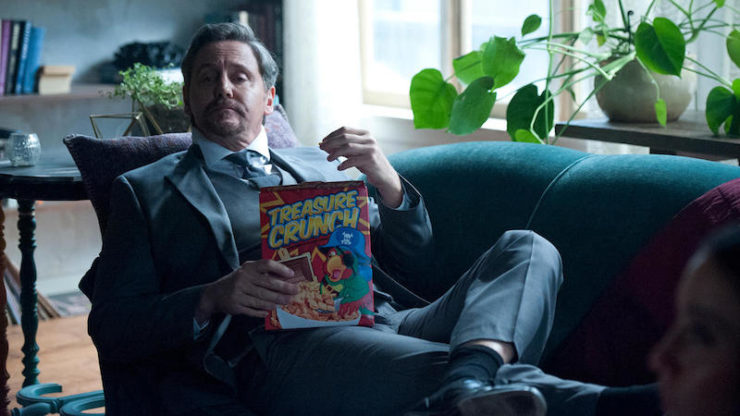
With three sets of characters to jump between, this episode does a lot of dancing from one point to another—somewhat literally, where the Beast is concerned. He’s swanning about Julia’s apartment singing “If Love Were All” and proving that while he can’t work against her, given their agreement, he also doesn’t have to do exactly what she says. Sure, he drops a few vaguely useful hints about how he just might have cursed Fillory’s throne room, but he also teleports himself out of her place and onto a random Manhattan corner, where a singing man in a suit gets no second glances whatsoever.
He’s determined that they need fresh bait, and who does he drag back to Julia’s to serve that purpose? That’s right: Marina, accurately described as “sheer hellcat perfection.” But she’s nobody’s bait. Julia’s still scared of Marina, and rightly so, but the best thing about this exchange is what happens after. Marina’s no fool. She understands that the threat of Reynard is very real. She just doesn’t want to do things Julia’s way. Or the Beast’s, for that matter.
Meanwhile, at Brakebills, Margo’s pranks have hidden the cottage even from her. Here, little has changed, except that Eliot’s not the one making the drinks. It’s disconcerting, both to us and to our heroes, such as they are: life goes on without them. People are probably still going to classes, even! What a strange thought. Almost as strange as the notion that Brakebills maybe doesn’t have a librarian. Why is Sunderland—bless her—the person who knows the library best?
It’s convenient, I suppose, in that there’s no need to introduce another professor. And Anne Dudek’s Sunderland is a great balancing force on the flailing, panicked students: Preternaturally calm, impatient, logical, and perceptive, she wants to know the why of things. It makes sense that she knows where things are in the library—well, as much as this library makes sense, with its apparently moody verbal-command card catalog and hiding books. (And oh, the delightful cover of Hotel Spa Potions. Syfy needs to sell journals with that cover.)
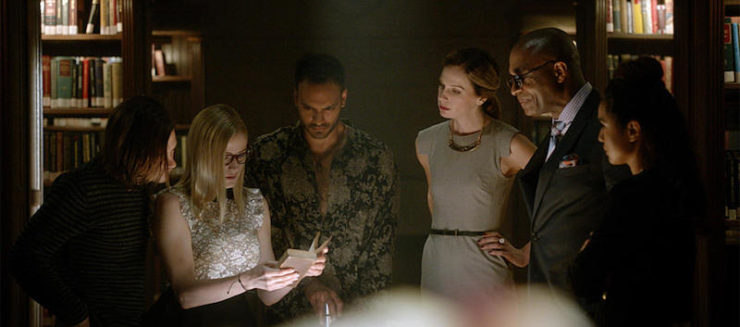
It also makes sense that Sunderland immediately picks up on Penny’s distress, and just as quickly has an idea about how to help when Margo’s hangover is no longer enough. Penny’s clearly not giving up on seducing her, though she’s far too practical to go down that problematic road. (At least until Penny graduates.)
And speaking of seductions, what fun is to be had with Bigby: pixie, former professor, keeper of battle magic secrets and, apparently, former lover of one Dean Fogg. Her riddles and tricks aren’t that hard—probably she wants Fogg to find her so she can have the delightful experience of saying I told you so (and/or inviting him to bed)—but she’s perfectly perplexing, coy one minute, practical the next. (Nobody say “manic pixie dream girl,” okay, Bigby deserves better.) She puts Quentin and Alice off-balance with every sentence, and you can see her reading them, calibrating what they need and just how badly they need it. “As strong as he is, you’re stronger,” she says to Alice, when she hands over the battle magic spell. “But not for long.”
(If sex or other obtaining-of-god-jizz always has this result, what happens if you sleep with a goddess?)
Leaving Eliot on his own seemed like a downer, at first, but his ascent to functional kingliness is oddly satisfying. Remember that he told Mike about his childhood, about his parents being farmers—and then said that he’d only told one other person this. That part of Eliot has been his secret, the thing he hides under style and brazenness and swigs from his flask.
But now it’s something vital, and watching Eliot deal with that that is one of the best parts of this episode. He gets dramatic, pretends he’s going to pass out or gag just thinking about the taste of goat milk, and describes his family as “the worst humans in the known universe” … and then he gets his shit together.
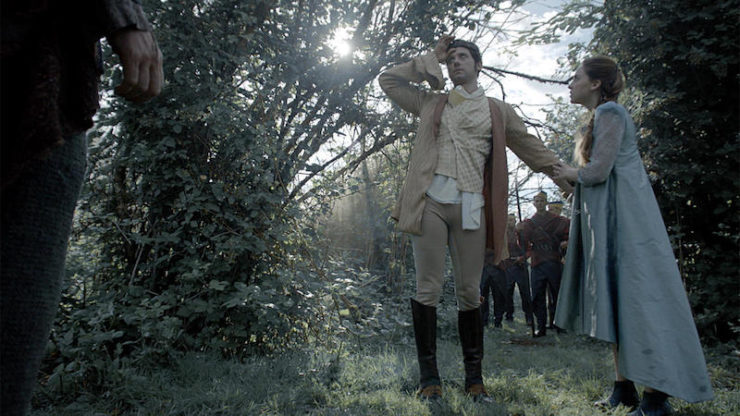
Does he resent that those worst people gave him the knowledge to save Fillory’s crops? Sure. But that won’t keep him from using what he knows. And I think he starts to enjoy it, to bask in knowing something that turns out to be special. (Poor Fen’s face when he tries to explain fertilizer.)
He also tries to find ways to enjoy himself despite the rules of his marriage—but winds up reminded that Eliot-the-useful is also Eliot-the-privileged. King Eliot has to understand that he’s not only got magical privilege; he’s got royalty privilege, and that means when he asks his courtiers to do a thing, they’re probably going to do it to keep their king happy—whether they really want to or not. Fen, on the other hand, knows what she wants.
Their relationship is turning out to be much more interesting—and complex—than I’d expected. So much is going on in this scene, from Fen reminding Eliot about consent and power to us being reminded that they’re both trapped in this magically fucked-up, forced-monogamy marriage. Fen’s desire complicates things. You could read this situation as the show pressing Eliot into having sex with a woman; while book-Eliot is certainly gay, and show-Eliot has thus far only expressed interest in men, the show also hasn’t come out and said that he’s gay, and some viewers have read him as bisexual.
So where does that leave us? Well, with two people in a politically and culturally horrible situation, trying to respect and be kind to each other to the best of their abilities, I think. On the one hand, Eliot, as king, can do whatever he likes, including saying no to Fen; on the other, Eliot, the person, seems to not want to hurt or reject her, and opts to view sex as a new experience. Underneath the jokes and awkward giggles, this is a really complicated scene, one that’s taking on guilt and pressure and consent and heteronormative power structures—and yet not entirely saying something solid about any of those things. But it does give the sense that this conversation isn’t over. The problem isn’t solved: it’s uncomfortable and weird and Fen and Eliot are going to be as gentle as they can with each other about it, at least.
That’s just so much to ask of Eliot, who has been through hell, and whose confidant is on another world at present. He’s on his own, he still hurts, and he’s got all the responsibility in the world.
And he doesn’t have a cacodemon. That scene is a cookie for book-fans, but also a sharp (and burning, and painful) comment about great power sometimes requiring great sacrifice—or, in this case, excruciating pain.
“Lift your shirt, Quentin, and turn around.”
“Oh, those words never led to anything good. Well. Almost never.”
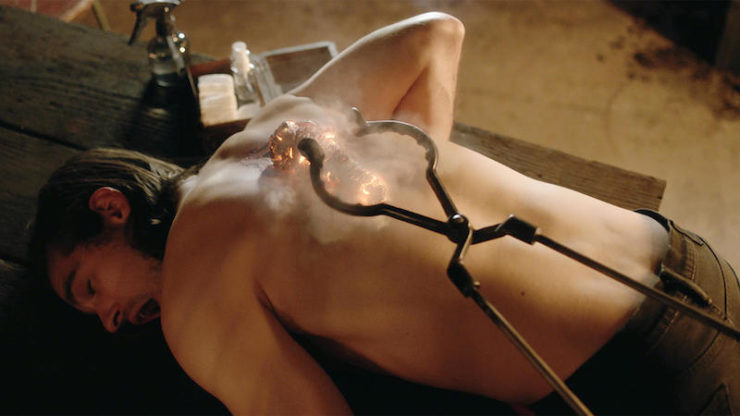
Oddly enough, this scene also acts as a sort of tension-breaker, the weird humor (and the relief of having a weapon always at hand) in balance with the agony. Like the Beast’s endless singing, it underlines the way nothing in Magicians-land isn’t just one thing or the other. The Beast is a murderous monster and an abused child, petulant and vicious at once. Eliot is a heartbroken student and an unexpectedly useful king. Julia is a victim and a fighter—and Marina is an enemy and a teammate.
When Marina comes back to Brooklyn, having seen firsthand what Reynard does, she’s terrified, but she’s still going to play it like she came back for Julia’s own good. Not for herself. Not because of the fear that drove her to ask asylum at Brakebills. (Oh, Fogg, you may come to regret this.) When Marina knows she can’t stand alone, shit is really bad. But she and Julia, sharing a cigarette and a lot of eyerolls and enduring Martin Chatwin’s Musical Review, are the best teamup, partly because they both resent the hell out of it.
“Are we three going to kill a god?”
“Yeah, for starters.”
But will they get in Quentin and company’s way? Will battle lines be crossed, weapons flung at the wrong people? When Q says “No, not him. Us,” he’s telling Julia that they’re dangerous too, his team of Brakebills students. They’re all dangerous. And they’re all fighting the same concept: A powerful being, taking power away from them and theirs. The trouble comes when one person thinks their fight is the most important, the priority at the expense of all others. What if they fought together? What if Quentin and pals made a pact with Julia to help her fight Reynard first? What if they remembered, for more than a second here and there, what she’s been through?
No time for that, though, given next week’s promo. Beast Battle Redux: Who survives?
Molly Templeton still wants all of Julia’s drapey sweaters. You can recommend similar garb to her on Twitter.










